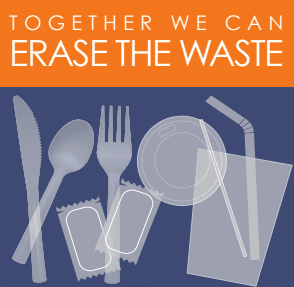 Beginning Jan. 1, 2022, Bainbridge Island restaurants, coffee shops and other businesses that deal directly with food and beverages will have to follow stricter guidelines – new regulations – in disposing of food service products. The new regs are part of the City of Bainbridge Island's effort "to reduce greenhouse gas emissions and protect our waterways," says City Manager Blair King.
Beginning Jan. 1, 2022, Bainbridge Island restaurants, coffee shops and other businesses that deal directly with food and beverages will have to follow stricter guidelines – new regulations – in disposing of food service products. The new regs are part of the City of Bainbridge Island's effort "to reduce greenhouse gas emissions and protect our waterways," says City Manager Blair King.
Under the new legislation – approved by the City Council earlier this year – Bainbridge retail food establishments may only provide single-use food service products to customers upon the customer's affirmation or request. Examples of single-use food service products are utensils, straws, condiments in packaging, and cold beverage cup lids. Restaurants are not allowed to make these products available in self-serve bins, dispensers, or containers.
With financial support from the City, the Bainbridge Island Chamber of Commerce, Bainbridge Island Zero Waste/ Sustainable Bainbridge, and the Bainbridge Island Downtown Association have formed the Bainbridge Business Ambassador program aimed at helping businesses comply with the City's new waste reduction ordinance, King says.
The Business Ambassadors have contacted more than 90 affected Bainbridge businesses, King adds, noting that as of Dec. 6, some 62% of Bainbridge businesses are already in compliance. The remaining 38% of businesses are gearing up to be in compliance at the start of the year, he says. The Business Ambassadors have been offering suggestions and listening to what, if any, "impediments" businesses face in complying. The cost of the educational program is just under $3,000, King further adds.
According to Diane Landry of Zero Waste, who served as a Business Ambassador, some local businesses are indeed taking it upon themselves to comply with the new rules ahead of the New Year. For example, Island Bite, which provides a home delivery service from restaurants to residents, is already alerting customers on its website that they will need to indicate whether they want utensils, straws/stirrers, and condiments/sauces. Island Bite will also notify restaurants about the change and will tailor its message for restaurants, if warranted.
To make up for the additional cost of doing business under the new regulations, Landry says some places already are charging through Island Bites for accessories. Pau's Asian Kitchen is adding 5 or 10 cents for chopsticks and condiments, and Joe's To Go Restaurant at Pleasant Beach is charging a 5% packaging fee. In Downtown Winslow, the popular Bruciato's is adding a 7% charge for a pizza box, while coffee shops and other to go spots will likely charge customers a 25-cent cup fee.
"These new regulations are intended to reduce the amount of waste we generate, which often ends up as pollution in our local waterways and the ocean," King says. "Single-use food service products are ubiquitous, and it takes a lot of energy to manufacture and distribute those products. Although they are used for just a few minutes before being discarded, the environmental impacts last long into the future."
The City Council has adopted additional restrictions on disposable food service items, which will become effective Jan. 1, 2023. A grant application for $60,000 has been submitted to the Washington State Department of Ecology for additional funds for more education, promotion, and incentives to help reduce waste, shrink our contribution to landfills, and lessen our carbon footprint, King says.
"It is important to acknowledge and thank businesses that are complying with Bainbridge Island's waste reduction efforts.," the City Manager stresses. "The best way to acknowledge and thank businesses is to patronize them. Financially support those businesses who have good environmental practices."
Per Margaret Millmore, who also served as a Business Ambassador for the program (and is the co-author of The Island Wanderer Blog), taking a reusable container with you when you dine-in and think you might have leftovers to take home is a great way to help reduce waste. In addition, when placing a to-go order in person at a restaurant, bring a reusable container and ask them to package your to-go food in the container. Of course, bringing your own travel cup for cold and hot beverages is also a great way to reduce waste.

